Dissertation Proposal on Waste Management
Added on 2023-05-30
40 Pages11409 Words175 Views
Running head: DISSERTATION PROPOSAL ON WASTE MANAGEMENT 1
Dissertation proposal on waste management
Name
Institutional Affiliation
Dissertation proposal on waste management
Name
Institutional Affiliation
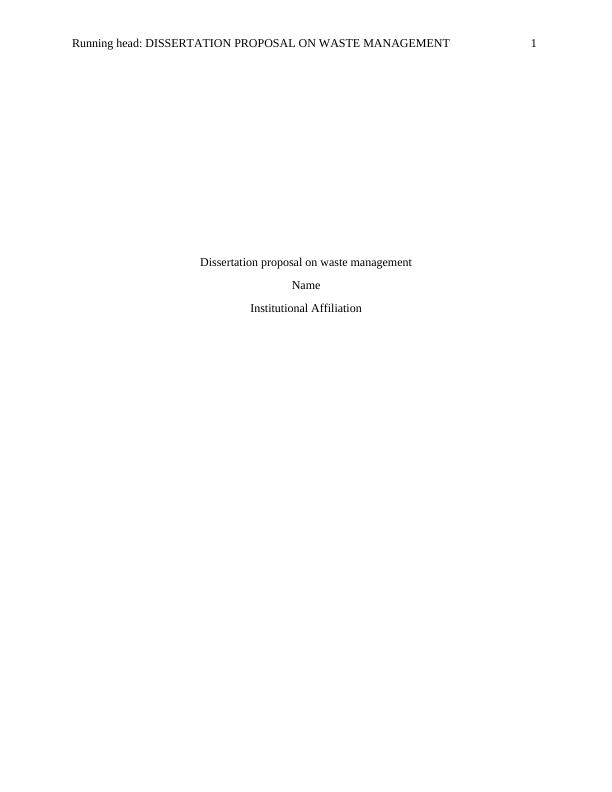
DISSERTATION PROPOSAL ON WASTE MANAGEMENT 2
Table of Content
Section 1: Introduction.........................................................................................................................4
1.1 Section Overview..............................................................................................................................4
1.2 The Research Background.................................................................................................................6
1.3 The Justification of this Study...........................................................................................................9
1.4 The Research Objective and Questions............................................................................................10
1.4.1 Research Goal & Objectives.....................................................................................................10
Research Goal....................................................................................................................................10
Research Objectives..........................................................................................................................10
1.4.2 Research Questions.......................................................................................................................10
1.5 The Contribution of this Study........................................................................................................11
Section 2: Literature review...............................................................................................................11
2.1 Section Overview............................................................................................................................11
2.2 Corporate Social Responsibility......................................................................................................15
2.3 Sustainability...................................................................................................................................17
2.4 CSR and Sustainability Practices in Russia.....................................................................................18
2.5 Sustainability and CSR Global Practices in waste management......................................................20
2.6 Theoretical Framework....................................................................................................................22
Section 3: Methodology.....................................................................................................................24
3.1 Section overview.............................................................................................................................24
3.2 Research Philosophy, Research Approach and Methodological Choice..........................................25
3.2.1 Quantitative research methods..................................................................................................25
3.2.2 Qualitative research method.....................................................................................................25
3.4 Research Methods............................................................................................................................26
3.5 Case selection, Sampling and Participants, Case study design.........................................................27
3.5.1 Selection of respondents...........................................................................................................28
3.6 Data Collection and Data Analysis..................................................................................................29
3.6.1 Data collection..........................................................................................................................29
3.6.1.1 Secondary data collection..................................................................................................29
3.6.1.2 Primary data collection......................................................................................................30
3.6.1.3 Interview............................................................................................................................30
3.6.1.4 Structured interview...........................................................................................................31
3.6.1.5 Non-participant observation...............................................................................................31
Table of Content
Section 1: Introduction.........................................................................................................................4
1.1 Section Overview..............................................................................................................................4
1.2 The Research Background.................................................................................................................6
1.3 The Justification of this Study...........................................................................................................9
1.4 The Research Objective and Questions............................................................................................10
1.4.1 Research Goal & Objectives.....................................................................................................10
Research Goal....................................................................................................................................10
Research Objectives..........................................................................................................................10
1.4.2 Research Questions.......................................................................................................................10
1.5 The Contribution of this Study........................................................................................................11
Section 2: Literature review...............................................................................................................11
2.1 Section Overview............................................................................................................................11
2.2 Corporate Social Responsibility......................................................................................................15
2.3 Sustainability...................................................................................................................................17
2.4 CSR and Sustainability Practices in Russia.....................................................................................18
2.5 Sustainability and CSR Global Practices in waste management......................................................20
2.6 Theoretical Framework....................................................................................................................22
Section 3: Methodology.....................................................................................................................24
3.1 Section overview.............................................................................................................................24
3.2 Research Philosophy, Research Approach and Methodological Choice..........................................25
3.2.1 Quantitative research methods..................................................................................................25
3.2.2 Qualitative research method.....................................................................................................25
3.4 Research Methods............................................................................................................................26
3.5 Case selection, Sampling and Participants, Case study design.........................................................27
3.5.1 Selection of respondents...........................................................................................................28
3.6 Data Collection and Data Analysis..................................................................................................29
3.6.1 Data collection..........................................................................................................................29
3.6.1.1 Secondary data collection..................................................................................................29
3.6.1.2 Primary data collection......................................................................................................30
3.6.1.3 Interview............................................................................................................................30
3.6.1.4 Structured interview...........................................................................................................31
3.6.1.5 Non-participant observation...............................................................................................31
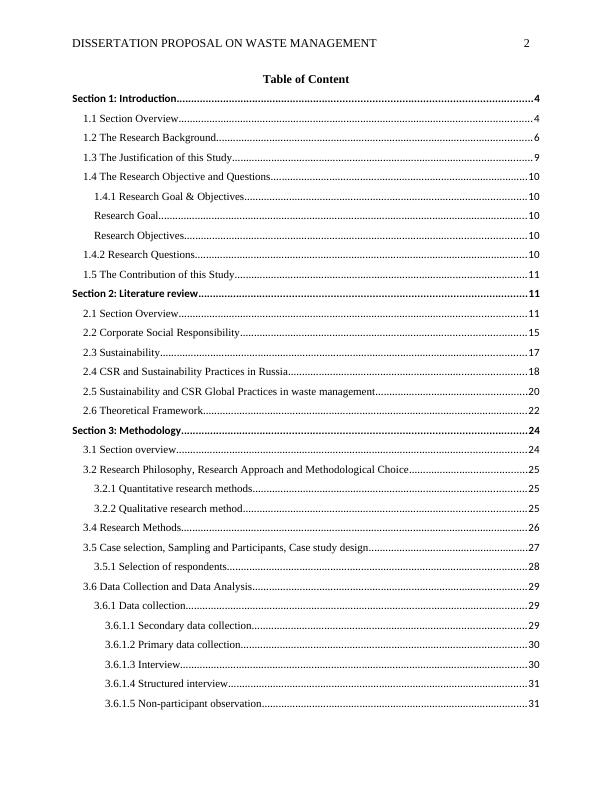
DISSERTATION PROPOSAL ON WASTE MANAGEMENT 3
3.6.1.7 Field Survey.......................................................................................................................33
3.6.1.8 Focus Groups.....................................................................................................................34
3.6.2 Data analysis.............................................................................................................................35
3.7 Data reliability and validity..............................................................................................................37
3.8 Ethical considerations......................................................................................................................37
Section 4: References.........................................................................................................................38
3.6.1.7 Field Survey.......................................................................................................................33
3.6.1.8 Focus Groups.....................................................................................................................34
3.6.2 Data analysis.............................................................................................................................35
3.7 Data reliability and validity..............................................................................................................37
3.8 Ethical considerations......................................................................................................................37
Section 4: References.........................................................................................................................38
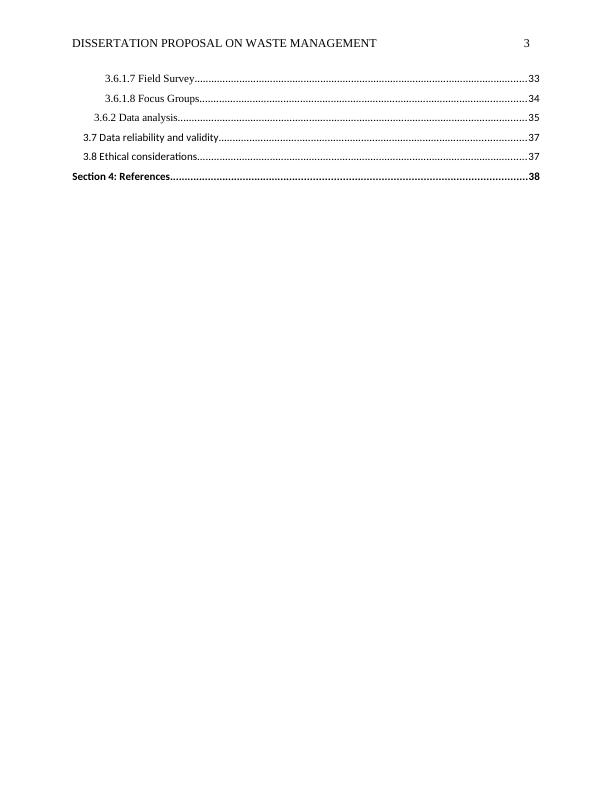
DISSERTATION PROPOSAL ON WASTE MANAGEMENT 4
Section 1: Introduction
1.1 Section Overview
Urban solid waste management remains a serious problem in cities around the world. It is a
nuisance to the quality of the environment in cities and with the rapid growth of cities and urban
centers, the problem is even more pronounced.
Waste management plays a critical role in the sustainability of cities. This research seeks to
demonstrate the need for a waste management system and its integration to sustainability
planning for urban areas. A sustainable urban system should assimilate the waste it generates
instead of exporting it to other jurisdictions for disposal.
Waste management can be linked with three major planning lenses including
Land use
Economic development
Environmental planning
Russia being one of the largest economies in the world is a large producer of waste. In total
about 55-60 million tons of waste is produced annually and is mainly composed of food, paper,
polymers, glass, wood, street waste metal, textile, and other waste materials (Howes, 2009).
More than 200 cities have exceeded the pollution limits in Russia and this limit is exceeded even
more with the increase of vehicles on the roads.
Moscow contributes averagely 20% of the total waste due to its dense population with only 4%
of this waste getting recycled. Solid waste management practices like recycling; separation and
incineration are not used in Russia (Kurian, 2007). With over 90% of waste ending up in
landfills, waste has exceeded the capacity limits of existing landfills in the country leading to
Section 1: Introduction
1.1 Section Overview
Urban solid waste management remains a serious problem in cities around the world. It is a
nuisance to the quality of the environment in cities and with the rapid growth of cities and urban
centers, the problem is even more pronounced.
Waste management plays a critical role in the sustainability of cities. This research seeks to
demonstrate the need for a waste management system and its integration to sustainability
planning for urban areas. A sustainable urban system should assimilate the waste it generates
instead of exporting it to other jurisdictions for disposal.
Waste management can be linked with three major planning lenses including
Land use
Economic development
Environmental planning
Russia being one of the largest economies in the world is a large producer of waste. In total
about 55-60 million tons of waste is produced annually and is mainly composed of food, paper,
polymers, glass, wood, street waste metal, textile, and other waste materials (Howes, 2009).
More than 200 cities have exceeded the pollution limits in Russia and this limit is exceeded even
more with the increase of vehicles on the roads.
Moscow contributes averagely 20% of the total waste due to its dense population with only 4%
of this waste getting recycled. Solid waste management practices like recycling; separation and
incineration are not used in Russia (Kurian, 2007). With over 90% of waste ending up in
landfills, waste has exceeded the capacity limits of existing landfills in the country leading to
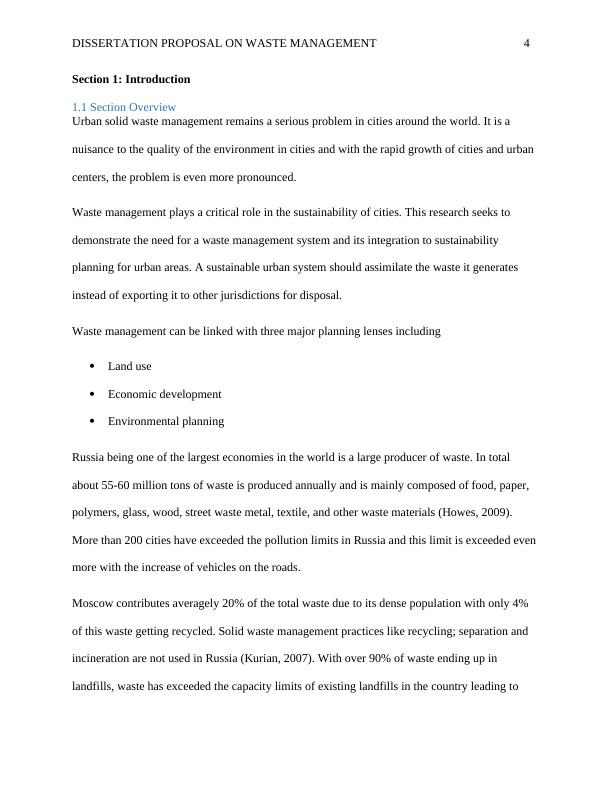
DISSERTATION PROPOSAL ON WASTE MANAGEMENT 5
challenges for the environment and the populations living around. Some of these challenges
include
1. Oder/ bad smell
2. Release of Toxic gases
3. Pollution of ground water resources
4. Unauthorized landfills and waste disposal sites that occupy up to 4 million hectares
This research investigates the effects of urban growth on waste management systems,
opportunities and challenges in solid waste management systems and the nature of current waste
management as well as actions being taken to account for future increase in waste loads in
Russia
The Russian government, in response to the solid waste management problem, has
pursued different ways to improve its waste management system. These include:
1. Processing of solid waste -The Russian government targets achieve 80% processing of its
solid waste by 2030
2. Enactment of new policies to guide packaging and waste management (2016)- as per this
legislation producers are mandated to either recycle between 10-30 % of waste produced
themselves or hire qualified third parties to do it for them otherwise they are supposed to
pay the government an ecological fee for their waste.
3. Development of a map by green peace Russia showing the nearest points for separated
waste collection to allow citizens contribute to separation of the waste they produce
4. Development of new smart land fills
5. Upgrading of preexisting land fills
challenges for the environment and the populations living around. Some of these challenges
include
1. Oder/ bad smell
2. Release of Toxic gases
3. Pollution of ground water resources
4. Unauthorized landfills and waste disposal sites that occupy up to 4 million hectares
This research investigates the effects of urban growth on waste management systems,
opportunities and challenges in solid waste management systems and the nature of current waste
management as well as actions being taken to account for future increase in waste loads in
Russia
The Russian government, in response to the solid waste management problem, has
pursued different ways to improve its waste management system. These include:
1. Processing of solid waste -The Russian government targets achieve 80% processing of its
solid waste by 2030
2. Enactment of new policies to guide packaging and waste management (2016)- as per this
legislation producers are mandated to either recycle between 10-30 % of waste produced
themselves or hire qualified third parties to do it for them otherwise they are supposed to
pay the government an ecological fee for their waste.
3. Development of a map by green peace Russia showing the nearest points for separated
waste collection to allow citizens contribute to separation of the waste they produce
4. Development of new smart land fills
5. Upgrading of preexisting land fills
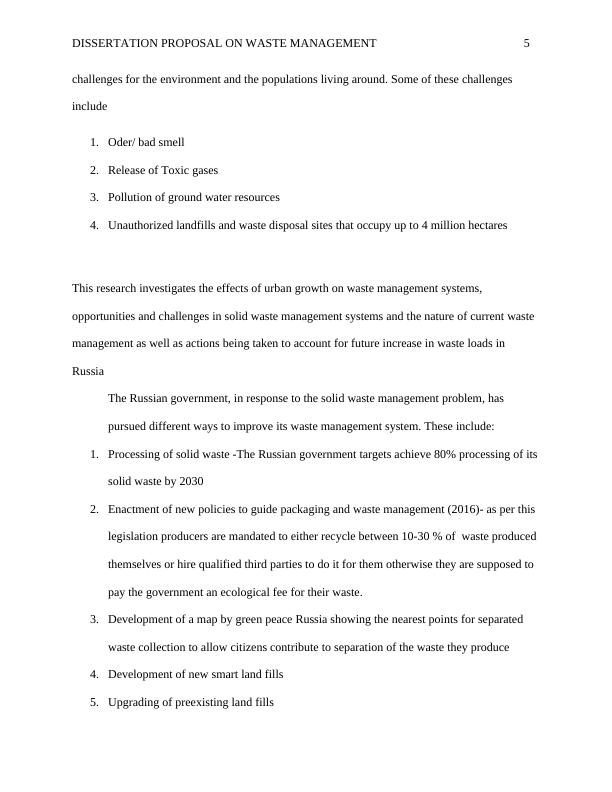
DISSERTATION PROPOSAL ON WASTE MANAGEMENT 6
6. Incineration of waste
7. Building of waste utilization plants
8. Development of infrastructure for recycling of waste
1.2 The Research Background
Municipal solid waste (MSW) management system is one of the key components of a country’s
overall environmental and resource efficiency framework. Russia’s waste management system
has largely been dominated by the state however today private companies have taken
approximately 40% of the total market. The private establishments work closely with the
municipal solid waste management to ensure efficiency in collection, transportation and the
disposal.
According to the United Nations (2005), the conference held on agenda 21 of the Rio
declaration declared waste management as a global environmental problem that should be
handled with haste in order to maintain the quality of the earth’s environment. Waste generation
has been there with man since the beginning of life on earth. During the nomadic life when man
had to roam from one place to another, the issue of waste management was not a major concern,
not until recently when man started building permanent communities, the municipal government
started giving priority to waste management as a response to maintaining good public health and
safety. It is until the 19th century that the respective governments took the initiative of collecting
and disposing off waste in a more fashionable manner (Giusti, 2009). In most cities today, waste
is either managed by disposing them in designated areas or recycled for substantive use. A good
example is Russia.
6. Incineration of waste
7. Building of waste utilization plants
8. Development of infrastructure for recycling of waste
1.2 The Research Background
Municipal solid waste (MSW) management system is one of the key components of a country’s
overall environmental and resource efficiency framework. Russia’s waste management system
has largely been dominated by the state however today private companies have taken
approximately 40% of the total market. The private establishments work closely with the
municipal solid waste management to ensure efficiency in collection, transportation and the
disposal.
According to the United Nations (2005), the conference held on agenda 21 of the Rio
declaration declared waste management as a global environmental problem that should be
handled with haste in order to maintain the quality of the earth’s environment. Waste generation
has been there with man since the beginning of life on earth. During the nomadic life when man
had to roam from one place to another, the issue of waste management was not a major concern,
not until recently when man started building permanent communities, the municipal government
started giving priority to waste management as a response to maintaining good public health and
safety. It is until the 19th century that the respective governments took the initiative of collecting
and disposing off waste in a more fashionable manner (Giusti, 2009). In most cities today, waste
is either managed by disposing them in designated areas or recycled for substantive use. A good
example is Russia.
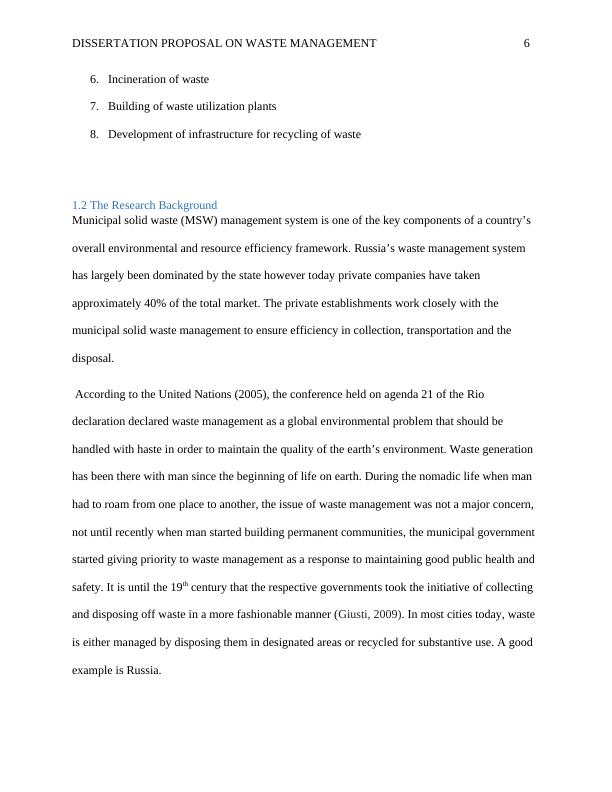
DISSERTATION PROPOSAL ON WASTE MANAGEMENT 7
Russia today has 243 treatment plants, 40 incineration or combustion plants, and 53 sorting
station, which are unable to handle the load from its urban centers (Tulokhonova & Ulanova,
2013). A large number of the landfills were established two decades ago and so many do not
meet the sanitation standards pf the modern world.
Owing to the need to allocate more landfills, the Russian government has committed to
establishing better waste management policies. This problem is compounded by the fact that
about 70 % of collection and haulage infrastructure for waste in Russia is obsolete
Waste recovery rate in Russia is nearly zero compared to its European Union counterparts that
recover averagely 60% of their Municipal solid waste. This is due to resource inefficient waste
management practices in Russia and suboptimal use of energy and raw materials. It is predicted
that with the current trend the municipal solid waste in Russia will double in 10-15 years
By implementation of modern technologies and optimization of its waste management practices
Russia can shift fully to efficient and environmentally friendly waste management system by the
year 2025. The recovered waste, which is averagely 45%, will act as energy and raw materials as
opposed to occupying landfills. This represents about 200 metric tons of municipal solid waste
Moscow Russia’s capital contributes largely to the municipal waste management problem
producing over 25 Million tons of waste due to the level of industrial production in the city
spanning many of the economic branches (Tulokhonova & Ulanova, 2013). The composition of
this waste mainly includes residential solid waste, industrial waste, bulk waste, waste from water
treatment facility and construction site waste.
Vehicles continue to increase in Moscow while increasing the atmospheric pollution, land
Russia today has 243 treatment plants, 40 incineration or combustion plants, and 53 sorting
station, which are unable to handle the load from its urban centers (Tulokhonova & Ulanova,
2013). A large number of the landfills were established two decades ago and so many do not
meet the sanitation standards pf the modern world.
Owing to the need to allocate more landfills, the Russian government has committed to
establishing better waste management policies. This problem is compounded by the fact that
about 70 % of collection and haulage infrastructure for waste in Russia is obsolete
Waste recovery rate in Russia is nearly zero compared to its European Union counterparts that
recover averagely 60% of their Municipal solid waste. This is due to resource inefficient waste
management practices in Russia and suboptimal use of energy and raw materials. It is predicted
that with the current trend the municipal solid waste in Russia will double in 10-15 years
By implementation of modern technologies and optimization of its waste management practices
Russia can shift fully to efficient and environmentally friendly waste management system by the
year 2025. The recovered waste, which is averagely 45%, will act as energy and raw materials as
opposed to occupying landfills. This represents about 200 metric tons of municipal solid waste
Moscow Russia’s capital contributes largely to the municipal waste management problem
producing over 25 Million tons of waste due to the level of industrial production in the city
spanning many of the economic branches (Tulokhonova & Ulanova, 2013). The composition of
this waste mainly includes residential solid waste, industrial waste, bulk waste, waste from water
treatment facility and construction site waste.
Vehicles continue to increase in Moscow while increasing the atmospheric pollution, land
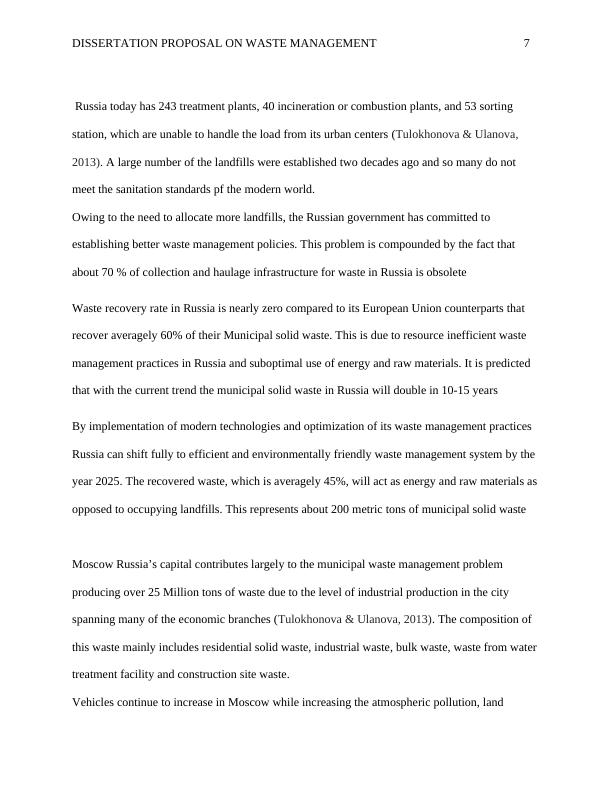
DISSERTATION PROPOSAL ON WASTE MANAGEMENT 8
pollution, pollution of reservoirs and accumulation of vehicle refuse. Moscow therefore has to
tackle the challenge of collection and utilization of decommissioned vehicles and automobile
wastes to avoid the littering. The city is also supposed to set up a system for collection and
utilization of electronic refuse and domestic waste. Both automobiles and electronic wastes
provide a good source for production of recycled products and should be in the cities short-term
outlook.
The following are volumes of secondary raw materials in Moscow in the year 1999 that were
either used in the city is recycled:
Construction waste – 300.000 tons
Metal scrap - 296,000 tons
Car battery lead - 265 tons
Glass - 21,000 tons
Oil-bearing waste - 4,328 tons
Paper waste - 62,500
Galvanizing plant refuse - 306 tons
The above waste is not recycled in Moscow rather it is transported to other regions. This is in
contravention of the world practice for sorting and recycles which requires that there is no
segregation of waste to reduce inefficiency.
Enterprises in Moscow, both private and medium sized, are gradually adapting the rational use of
waste as awareness of the economic profitability spreads. Many of these establishments have
pollution, pollution of reservoirs and accumulation of vehicle refuse. Moscow therefore has to
tackle the challenge of collection and utilization of decommissioned vehicles and automobile
wastes to avoid the littering. The city is also supposed to set up a system for collection and
utilization of electronic refuse and domestic waste. Both automobiles and electronic wastes
provide a good source for production of recycled products and should be in the cities short-term
outlook.
The following are volumes of secondary raw materials in Moscow in the year 1999 that were
either used in the city is recycled:
Construction waste – 300.000 tons
Metal scrap - 296,000 tons
Car battery lead - 265 tons
Glass - 21,000 tons
Oil-bearing waste - 4,328 tons
Paper waste - 62,500
Galvanizing plant refuse - 306 tons
The above waste is not recycled in Moscow rather it is transported to other regions. This is in
contravention of the world practice for sorting and recycles which requires that there is no
segregation of waste to reduce inefficiency.
Enterprises in Moscow, both private and medium sized, are gradually adapting the rational use of
waste as awareness of the economic profitability spreads. Many of these establishments have
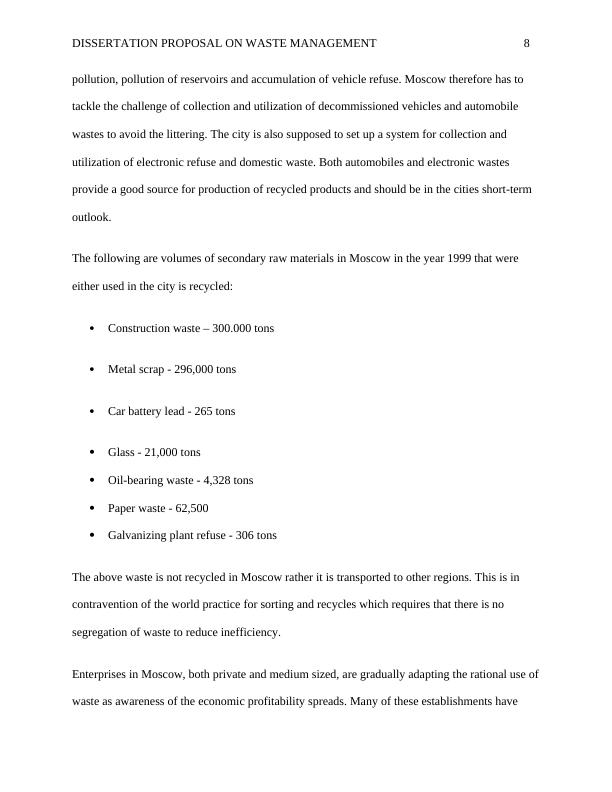
End of preview
Want to access all the pages? Upload your documents or become a member.
Related Documents
Demolition Waste in Construction Industry Research 2022lg...
|36
|8856
|14
A Case Study on Recycling in the Hospitality Industry : Rosewood Hotel London ABSTRACTlg...
|44
|9835
|239
Corporate Social Responsibility and the Impact on Business Growth: A Case Study on Nikelg...
|67
|21308
|63
Waste Biomass of Crops in United Kingdom: Biomass Conversion Technology and Combustion Processlg...
|63
|14130
|430
Impact of Corporate Social Responsibility (CSR)lg...
|41
|12349
|30
Effects of Organisational Culture on Employee Motivationlg...
|81
|20732
|192